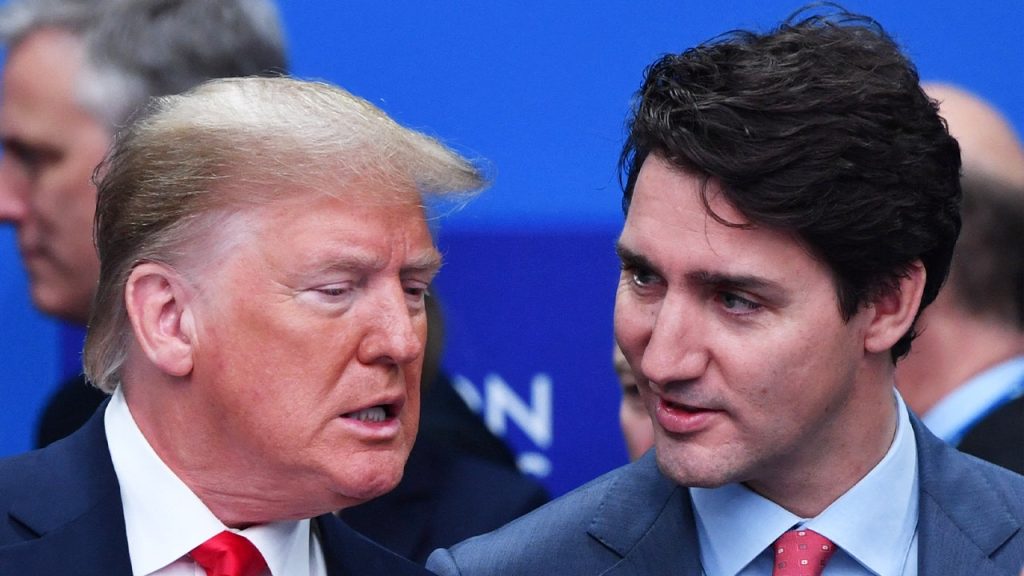The looming inauguration of President-elect Donald Trump has spurred a flurry of diplomatic activity, most recently exemplified by a visit from two high-ranking Canadian ministers to Trump’s Florida residence, Mar-a-Lago. Finance Minister Dominic LeBlanc and Foreign Minister Mélanie Joly embarked on this mission just days after Christmas, underscoring the urgency of addressing critical bilateral issues before Trump assumes office. Their agenda is multifaceted, encompassing border security, trade, and the burgeoning fentanyl crisis. This meeting follows previous discussions between Prime Minister Justin Trudeau and Trump, as well as a preliminary call between the Canadian ministers and Tom Homan, Trump’s designated “border czar,” setting the stage for more in-depth negotiations. The Canadian delegation aims to preemptively address potential trade disputes, particularly Trump’s threatened tariffs on Canadian goods, and highlight the collaborative efforts Canada has undertaken to secure its borders and combat drug trafficking. Underlying this diplomatic outreach is the specter of strained relations between the two nations, fueled by Trump’s public pronouncements and unconventional approach to international relations.
The primary impetus for this high-level meeting is Trump’s repeated threats to impose tariffs on Canadian imports unless Canada takes more stringent measures to curb the flow of migrants and fentanyl into the United States. This threat poses a significant economic risk to Canada, given the deep integration of the two countries’ economies. The daily cross-border trade in goods and services amounts to billions of dollars, and Canada serves as the primary export destination for numerous U.S. states. The Canadian ministers hope to persuade Trump that Canada is a proactive partner in addressing border security concerns, showcasing the initiatives outlined in Canada’s Border Plan. They aim to illustrate the potentially detrimental impact of tariffs on both nations, emphasizing the interconnectedness of their economies and the mutual benefits of maintaining a stable trade relationship. The visit also serves as an opportunity to discuss collaborative efforts to combat the fentanyl crisis, a shared concern that demands a coordinated response.
The backdrop to these discussions is a complex interplay of political and economic factors. Trump’s rhetoric towards Canada, including his social media pronouncements referring to Prime Minister Trudeau as “Governor,” has created an atmosphere of uncertainty and tension. His suggestion that Canada become the 51st U.S. state, albeit likely intended as a provocative remark, further underscores the unconventional nature of his approach to international relations. This unconventional approach has injected a degree of unpredictability into the relationship between the two traditionally close allies. Canada faces the challenge of navigating this new diplomatic landscape while safeguarding its economic interests and maintaining a productive working relationship with its largest trading partner. The ministers’ visit to Mar-a-Lago represents a proactive attempt to address these challenges directly and build a foundation for future cooperation.
Beyond the immediate concerns of border security and trade, the Canadian delegation also seeks to address the growing fentanyl crisis, which has devastating consequences for both nations. Fentanyl, a highly potent synthetic opioid, has fueled a dramatic increase in overdose deaths in both the U.S. and Canada. The cross-border flow of this deadly drug requires a coordinated response, involving information sharing, law enforcement cooperation, and public health initiatives. The Canadian ministers intend to highlight Canada’s efforts to combat fentanyl trafficking and emphasize the need for a collaborative approach to address this shared challenge. This shared challenge transcends political differences and necessitates a unified front to effectively combat the devastating impact of this opioid epidemic.
The timing of the Canadian ministers’ visit, just days after Christmas and shortly before Trump’s inauguration, underscores the urgency of these discussions. The incoming administration’s policies and priorities are still taking shape, providing a crucial window of opportunity for Canada to present its case and influence the direction of future bilateral relations. By engaging directly with Trump and his advisors, the Canadian government seeks to establish a clear understanding of its position and foster a cooperative approach to addressing shared challenges. This proactive engagement aims to mitigate potential misunderstandings and build a foundation for a mutually beneficial relationship going forward. The success of this visit will likely depend on the ability of the Canadian delegation to effectively communicate its message and persuade the incoming administration of the merits of its proposed approach.
In conclusion, the visit by Canadian Finance Minister Dominic LeBlanc and Foreign Minister Mélanie Joly to President-elect Trump’s Mar-a-Lago residence represents a pivotal moment in the evolving relationship between Canada and the United States. The discussions on border security, trade, and the fentanyl crisis are crucial for both nations. Canada seeks to address Trump’s tariff threats, highlight its commitment to border security, and foster collaboration on combating the fentanyl crisis. The success of this diplomatic mission hinges on the ability of the Canadian delegation to navigate the complexities of the incoming administration and build a foundation for a productive and mutually beneficial relationship in the years ahead. The outcome of these discussions will significantly impact the future economic and security relationship between the two closely intertwined North American nations.

